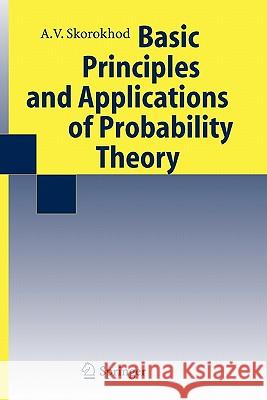Basic Principles and Applications of Probability Theory » książka
Basic Principles and Applications of Probability Theory
ISBN-13: 9783642081217 / Angielski / Miękka / 2010 / 282 str.
Probability theory arose originally in connection with games of chance and then for a long time it was used primarily to investigate the credibility of testimony of witnesses in the ethical sciences. Nevertheless, probability has become a very powerful mathematical tool in understanding those aspects of the world that cannot be described by deterministic laws. Probability has succeeded in ?nding strict determinate relationships where chance seemed to reign and so terming them laws of chance combining such contrasting - tions in the nomenclature appears to be quite justi?ed. This introductory chapter discusses such notions as determinism, chaos and randomness, p- dictibility and unpredictibility, some initial approaches to formalizing r- domness and it surveys certain problems that can be solved by probability theory. This will perhaps give one an idea to what extent the theory can - swer questions arising in speci?c random occurrences and the character of the answers provided by the theory. 1. 1 The Nature of Randomness The phrase by chance has no single meaning in ordinary language. For instance, it may mean unpremeditated, nonobligatory, unexpected, and so on. Its opposite sense is simpler: not by chance signi?es obliged to or bound to (happen). In philosophy, necessity counteracts randomness. Necessity signi?es conforming to law it can be expressed by an exact law. The basic laws of mechanics, physics and astronomy can be formulated in terms of precise quantitativerelationswhichmustholdwithironcladnecessity."











